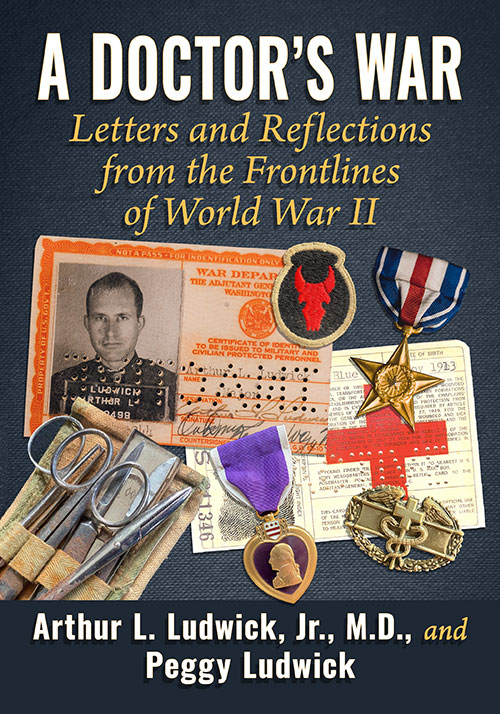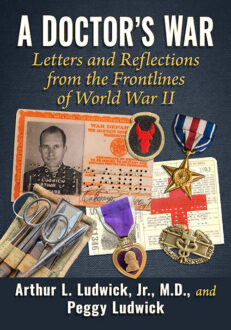A Doctor’s War
Letters and Reflections from the Frontlines of World War II
$39.95
In stock
About the Book
A medical officer in the 34th “Red Bull” Infantry Division on the front lines of World War II, Lt. Col./Maj. Arthur L. Ludwick, Jr., was responsible for the well-being of traumatized and wounded American soldiers through some of the bloodiest engagements in North Africa and Italy: Kasserine and Fondouk Passes, Hill 609, Monte Pantano, Cassino, and Anzio. He was awarded both the Purple Heart and Silver Star, unusual combat commendations for an unarmed medical officer. His letters home detail his experiences, with keen observations of the people and landscapes. Based on Ludwick’s letters and an archive of interviews, military documents and photos, this multifaceted narrative, compiled by his daughter, also tells the story of her discovery of her father as the young man she never knew.
About the Author(s)
Bibliographic Details
Arthur L. Ludwick, Jr., M.D., and Peggy Ludwick
Format: softcover (7 x 10)
Pages: 264
Bibliographic Info: 40 photos, appendices, bibliography, index
Copyright Date: 2022
pISBN: 978-1-4766-8909-8
eISBN: 978-1-4766-4729-6
Imprint: McFarland
Table of Contents
Acknowledgments ix
Preface 1
Introduction 5
Prologue 19
1. Camp Claiborne, Louisiana: 34th Infantry Division Training, February 1941–December 31, 1941 23
2. Northern Ireland: First U.S. Troops to Europe, January 26–December 20, 1942 40
3. North Africa: Operation TORCH and Meeting the Desert Fox, January 3–September 22, 1943 66
4. Italy: Battle Hardened, September 21, 1943–May 5, 1944 127
5. Winding Down: Anzio and Headed Home, March–April 1944 189
6. Chronology of Military Service and Major 34th Infantry Division Events: December 2, 1940–November 12, 1951 196
7. Walking Wounded 204
8. Epilogue: Return and Readjustment 214
9. Behind the Lines: A Daughter’s Reflections 226
Appendices
A: Silver Star Commendation 231
B: German Treatment of American POWs 233
C: Capt./Baron Rudolph Charles von Ripper and His “San Pietro, Italy, 1943” Etching 235
D: John “Jack” Vail Hoyer 237
E: 34th Infantry Division Buddies 240
Bibliography 245
Index 249
Book Reviews & Awards
• “Intimate and compelling. A Doctor’s War captures the vivid, often poignant experience of a frontline physician during the brutal campaigns in North Africa and Italy. Dr. Arthur L. Ludwick, Jr. illuminates not only the war, but also the humanity to be found despite the war.”—Rick Atkinson, author, consummate WWII historian and Pulitzer Prize winner for his The Liberation Trilogy
• “It wasn’t until after his death in 2008 that Peggy Ludwick discovered a trove of 265 letters her father had written home to his new bride during his 28 months of service on the frontlines of WWII. Most of those letters were written in the heat of battle in North Africa and Italy. Peggy quickly realized they were more than love letters—they were first-person accounts of what it was like to be a medical officer who endured some of the most brutal campaigns of the Mediterranean Theater. The letters are notable for their detail and insight—riveting reports by an astute observer of the violent drama that was evolving all around him. Lt. Col./Major Arthur L. Ludwick was a stickler for accuracy, describing in moving detail the medical challenges, as well as the human suffering he witnessed. This book is both a love story and a war story. For World War II history buffs, in particular, this will be a valuable addition to their library.”—Ed Stover, journalist, poet, editor
• “Peggy Ludwick’s depiction of the life of a combat Medical Officer in World War II draws from her father’s letters home to his young bride, from whom he was separated for two and a half years after just two months of marriage. With the 34th Infantry Division in Northern Ireland, North Africa, and Italy, Lt. Col./Maj. Arthur L. ‘Lud’ Ludwick treated soldiers suffering from injuries, PTSD, malaria and other illnesses, while keeping his troops’ spirits high amid 14 major engagements with the German Army. This personal account reflects Lud’s feelings, cultural observations, and successes in a way most WWII narratives fail to do.”—Chris Rader, writer/editor, author of Place of Plenty
• “Peggy Ludwick’s exploration of her father’s military service as a medical officer during World War Two, stands out as a valuable contribution to our understanding of that war because it also considers, from a very personal perspective, the postwar legacies of the brutal wartime conditions in North Africa and Italy. It is a remarkable reconsideration of the hidden costs of war, not only for those who suffered physical and psychological wounds from combat experience, but also for their families back home, both during and after the war. It is an admiring, but clear-eyed look at the hidden stories that shaped the father she thought she knew, and it will resonate with anyone who has known a person who rose to the occasion of wartime service—even heroically—while attempting to shield those they loved from the full psychological and physical impact of that service.”—Max G. Geier, Ph.D., professor of history, emeritus, Western Oregon University
• “Reading this book and being an ‘old’ soldier with fairly extensive knowledge of the Italian and North African Campaigns, gave me a personal identity with many of Major Ludwick’s wartime letters. He wasn’t just a Medical Officer, he was an important part of a Regimental Combat team’s leadership….Ludwick’s references to Hollywood-ish ideas is as true today as it was in WW2. There are basic, time tested, human emotions that come to the forefront in combat. They are primitive in nature and are unchanging over the generations. Ludwick’s descriptions, innovative methods, and training schedules on the essentials all recognized this fact. He truly had his finger on the pulse of the combat soldier….Major Ludwick’s descriptions about how he had changed were very emotional for an old soldier. He is correct in his understanding of how combat, deployments, separation from loved ones, finely tunes one’s priorities. The periods of prolonged loneliness, sheer boredom, total chaos, unspeakable horror all add up to wearing down even the strongest soldier. No amount of understanding from someone other than a fellow comrade-in-arms can understand the toll it takes.” —COL (Ret.) U.S. Army, Mike Penhallegon
• “Highly recommended”—Argunners Magazine.





